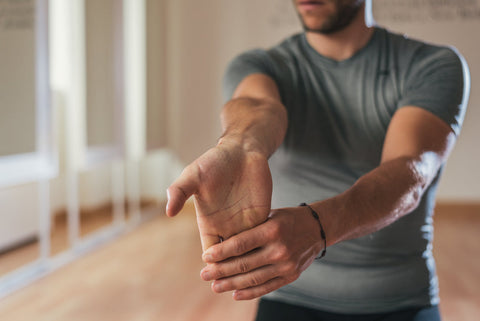

How your joints change with age
Do you remember the first time you noticed your joints feeling a little stiff? Was it when you found yourself saying ‘Oof!’ as you got up from a chair? Or maybe a time when it was suddenly more of a challenge to bend down and put on your socks and shoes?
There’s no doubt about it, stiff joints can be annoying. They can interfere with you moving as fluidly and freely as you’d like and can put a damper on some of your favourite activities.

Young joints run free
Back in the 70s, Candi Staton sang that ‘Young hearts run free’. You could say that young joints run free too. Because when we’re young, our joints tend to be at their most fluid and flexible.
Wherever two bones meet, we have joints that facilitate movement and help protect those bones from rubbing together. The articulated joints at our elbows, knees, ankles, shoulders and hips are called synovial joints. Inside these all-important joints, cartilage cushions the ends of the bones, and a synovial membrane releases a fluid that helps to lubricate the joint. Meanwhile, ligaments connect the bones, acting as shock absorbers and helping to stabilise the joint.
When we’re young, healthy joints are cushioned with plenty of cartilage and synovial fluid, and our ligaments are wonderfully flexible.
That means that children will generally find it much easier than their parents to run around, do cartwheels and spring up from chairs without saying ‘Oof!’
Age and your joints
As we get older, time can start to take a toll on our joints. This usually happens because:
- We produce less synovial fluid as we age. And when we have less synovial fluid, there’s less lubrication for our joints.
- The cartilage that cushions the ends of our bones inside the joints starts to become thinner.
- The ligaments inside our joints that connect our bones can become shorter and less flexible. This can also make our joints feel stiffer and less able to move freely.
The good news
Luckily, there are many ways that you can help improve your joint health – whatever your age.
-
Eat healthily
A varied, healthy diet will help you keep your joints in better shape. Eat the rainbow – brightly coloured fruits and vegetables – rich in antioxidants. Kale, broccoli, cabbage and sprouts should be top of your shopping list, as research from the University of East Anglia suggests that compounds like sulforaphane (which broccoli is a great source of) could aid joint health, mobility and cartilage.[1]
Foods rich in Omega-3 fatty acids are also important. These can include nuts and seeds, such as walnuts, pecan nuts, flax seeds and chia seeds; and fatty fish such as salmon, tuna and mackerel.

-
Keep those joints moving
Exercise is a great way to help your joints stay flexible. As you move, you encourage the synovial membrane to produce synovial fluid, which helps to lubricate your joints. Building muscle through exercise can also help to stabilise your joints. Plus, you’ll be stimulating your cardiovascular system, which will pump nutrients and oxygen into your joints, helping them to stay healthy.
Try exercises that are kind on your joints, such as walking, spinning, rowing, swimming, aqua aerobics and elliptical exercise machines.
-
Take a joint supplement
You could also try a joint supplement like iMOVE Active, our high-quality daily joint supplement for men and women that’s been specifically developed to help you enjoy an active lifestyle. Its unique triple-action formula provides key nutrients to keep you moving freely so you can keep living life to the full!
Maintaining an active life is great for our overall health and wellbeing, and the same is true for our animal friends, too! While you’re taking ‘steps’ to stay active and mobile, why not pick up a pack of YuMOVE Joint Care for Adult Dogs as well, and bring your canine companion along for the ride?
[1] https://www.sciencedaily.com/releases/2013/08/130827204039.htm




